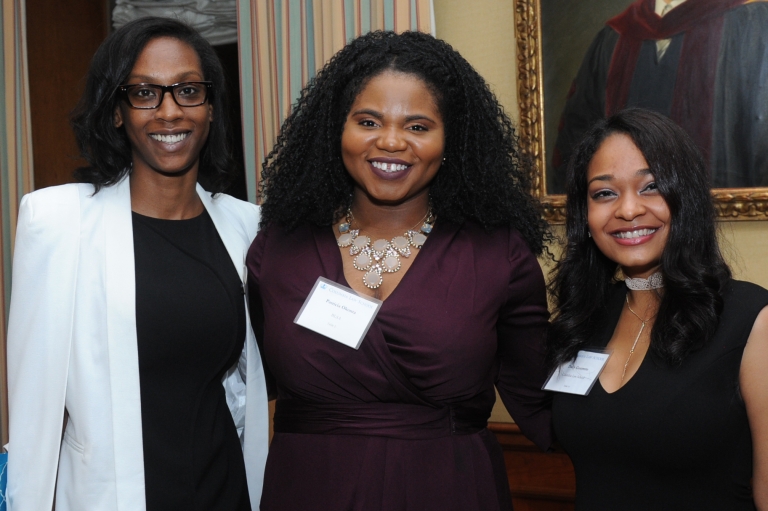Black Law Students Association Awards Three New Scholarships
Daily Guerrero ’17, Patricia Okonta ’18, and Kamilah Moore ’19 honored for their commitment to social justice.
One of Columbia Law School’s most dynamic student organizations with more than 150 active members, the Black Law Students Association (BLSA) has two overlapping goals: To help its constituents achieve academic and professional success; and to raise awareness within the Law School community about issues disproportionately impacting poor, minority, and black communities.
To that end, BLSA announced last year that it was establishing three competitive scholarships for students who’ve demonstrated an exceptional commitment to the group and to social justice issues. The inaugural winners, announced at the Paul Robeson Gala this past February, are Daily Guerrero ’17, Patricia Okonta ’18, and Kamilah Moore ’19.
Guerrero, who graduated this past May and has a summer fellowship at a civil rights law firm, won the Constance Baker Motley ’46 Scholarship, named for the country’s first black female federal judge. In September, Guerrero will start an 18-month Chadbourne & Parke Fellowship at The Door, a multi-service agency in New York City representing high-risk youth in immigration cases. “I see a lot of parallels between the civil rights struggle and the immigrants’ rights struggle that has become so salient in our times,” Guerrero said earlier this year. “If I can help a child stabilize their immigration status early on—for example, before they go to college—that can really change the trajectory of their life.”
Okonta, who grew up in Kansas City, Missouri, was awarded the Robert L. Carter ’41 LL.M. Scholarship, which is named for the judge and lawyer who was a leading strategist in the fight to end racial segregation and helped to argue Brown v. Board of Education before the U.S. Supreme Court. She says her commitment to civil rights and social justice was fostered during her undergraduate years at Yale, where she was president of the Black Student Alliance. As the institutional service coordinator for Dwight Hall at Yale, an independent social justice group, she also orchestrated three campus-wide days of community service in collaboration with more than 30 New Haven nonprofit organizations.
Since arriving at Columbia in 2015, Okonta has ramped up her public service commitments, which include executive board positions for the Student Public Interest Network (SPIN) and BLSA. “Coaching the Frederick Douglass Moot Court team was particularly satisfying because I had the opportunity to guide and support my peers on not only how to improve their oral advocacy skills, but also how to navigate law school,” she said.
With SPIN, Okonta has lobbied staff and administrators to provide more support and resources for public interest students. A highlight of her 2L year was organizing a SPIN panel called “CLS Public Interest Strategizing and Safe Space: Why Our Work is More Important Than Ever,” which was a rapid response to the 2016 presidential election. “It was a time for students, faculty, and practitioners to come together to reflect, react, and reorient our work moving forward as attorneys,” she said.
READ: Reclaiming the Narrative: The 23rd Annual Paul Robeson Gala and Conference
Like Okonta, Moore came to Columbia primed for a public service career. A 2014 graduate of UCLA, where she was chairperson of the Afrikan Student Union, Moore’s experiences prior to law school included stints as a substitute teacher in Los Angeles public schools and an internship with the White House Initiative on Education Excellence for African-Americans in Washington, D.C. “I decided to go to law school because I thought I could better utilize my skills and make change in society on a macro level,” she said.
Moore had a busy and productive 1L year outside the classroom. She became an at-large member of the Human Rights Institute Student Advisory Committee, a name-change advocate for the Transgender Legal Defense & Education Fund, a mentor for the High School Law Institute, a member of the NALSA Moot Court Team, and a 1L representative for the Workers’ Rights Student Coalition. On receiving the Eric Holder Jr. ’76 Scholarship, named after the former U.S. attorney general, she said, “I see him as a role model. He’s said he wants the scholarship to support students becoming agents of social good, and I am aspiring to do that.”
For her 2L year, Moore will serve on BLSA’s executive board as the group’s social consciousness chair. “BLSA has been integral to my development, and I really want to give back to first years,” she explained. “Affinity groups are crucial on campus.”
Okonta echoes Moore’s sentiments. “BLSA continues to make Columbia Law School home for me,” she said. “At all times, I feel supported by my colleagues and encouraged to be the best person and fiercest advocate I can be. I can always count on BLSA members to support me academically, professionally, and socially.”
###
Posted on June 27, 2017
